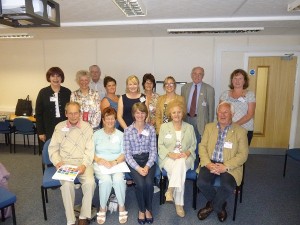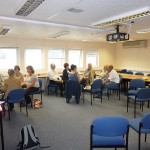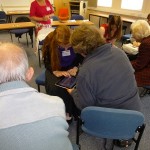‘Dementia Friendly’ is a sound bite used frequently at the moment in my field. This is in part due to the Prime Ministers 2012 Dementia Challenge which has a particular component aspiring to the creation of 20 dementia friendly towns/cities by 2015. But what does dementia friendly actually mean? and how do we know when we have an example of something that is dementia friendly? A colleague and I spent a week in New York City earlier this month and we were truly ‘wowed’ by the dementia friendly initiatives we witnessed. The first was at MOMA where they have an established programme for people with dementia that we were lucky enough to be able to join one afternoon. What made this programme dementia friendly? Three things in my view; first the educators (their term) made no attempt to ‘dumb down’ their offering to those with dementia (too often people with dementia are treated as less able without first having tested the waters to see if just because the label of ‘dementia’ applied means that the person is unable to participate in various everyday activites ‘as usual’ or if it needs modified in some way, in this case participating in an arts appreciation programme). Two it was extremely difficult to tell who might have dementia and who were the accompanying family members and finally the contributions from the group reflected the individual perspective different people have on what is ‘art’, what they like, or in the case of one man what was ‘trash’ (every piece we stopped at!). We were also invited to join a choir rehearsing in a cathedral (an extremely modern building that we walked by twice before realising this was the cathedral, another story…) for the final time before performing at MOMA the following week (we didn’t get to see the real performance as back at BU by then). This choir group, known as ‘The Unforgettables’, was amazing, the two directors created an unbelievable energy in the room, there was laughter, fun, serious points made about music/signing. Individuals who could barely walk took their turn to stand by the piano and sing heart rending solos which brought a tear to the eye, a lump to the throat. By contrast, other couples sang humourous duets. This was an inspiring group to witness. The choir directors had again made a conscious decision not to ‘dumb down’ their approach but to encourage and challenge, in the same way that they would any other choral group. The results were incredible. We were offered hospitality by the group members, the only tell tale sign that one particular man had dementia was his bringing us 5 cups of iced tea and numerous plates of fruit/cake/biscuits as he didn’t remember that he had already been up to the table and brought us over some goodies. We also visited the Metropolitan Museum, again with long established groups for people with dementia. Some involve art making, others art appreciation, others tours of different parts of the museum. Again the underpinning philosophy is one of ability to engage, to promote intellectual stimulation, social interaction and also the programmes encourage a degree of physical activity by choosing exhibits at various places throughout the building (mental, physical and social stimulation being key to reducing risk of developing dementia, but also to maintaining well-being once diagnosed).
We went to New York because we had heard about the programmes and wanted to see if possible to learn and implement back here in Dorset but also to meet with academic colleagues, present at NYU, meet with the US Alzheimer Association (which has really made us think about donations and fund raising to support our work) and these were also very productive parts of the trip and reinforced that the approach we are taking at BU Dementia Institute is one that we should continue (mainly that engagement and collaboration with the range of stakeholders that has been guiding our work should continue). But what stands out for me is the energy and enthusiasm of those running groups for people with dementia and the huge engagement and enjoyment this approach created. The US might not have a ‘dementia friendly agenda’ being driven at a national policy level, and New York might not immediately spring to mind as a place where one could live well with dementia, but the initiatives we saw clearly demonstrate the possibility to create dementia friendly environments even in places where sign posting might not be clear, transport busy and where the assumption that services ‘cost’ can be challenged (all the programmes we joined are free to those with dementia).



















 Expand Your Impact: Collaboration and Networking Workshops for Researchers
Expand Your Impact: Collaboration and Networking Workshops for Researchers Visiting Prof. Sujan Marahatta presenting at BU
Visiting Prof. Sujan Marahatta presenting at BU 3C Event: Research Culture, Community & Can you Guess Who? Thursday 26 March 1-2pm
3C Event: Research Culture, Community & Can you Guess Who? Thursday 26 March 1-2pm UKCGE Recognised Research Supervision Programme: Deadline Approaching
UKCGE Recognised Research Supervision Programme: Deadline Approaching ECR Funding Open Call: Research Culture & Community Grant – Apply now
ECR Funding Open Call: Research Culture & Community Grant – Apply now ECR Funding Open Call: Research Culture & Community Grant – Application Deadline Friday 12 December
ECR Funding Open Call: Research Culture & Community Grant – Application Deadline Friday 12 December MSCA Postdoctoral Fellowships 2025 Call
MSCA Postdoctoral Fellowships 2025 Call ERC Advanced Grant 2025 Webinar
ERC Advanced Grant 2025 Webinar Update on UKRO services
Update on UKRO services European research project exploring use of ‘virtual twins’ to better manage metabolic associated fatty liver disease
European research project exploring use of ‘virtual twins’ to better manage metabolic associated fatty liver disease